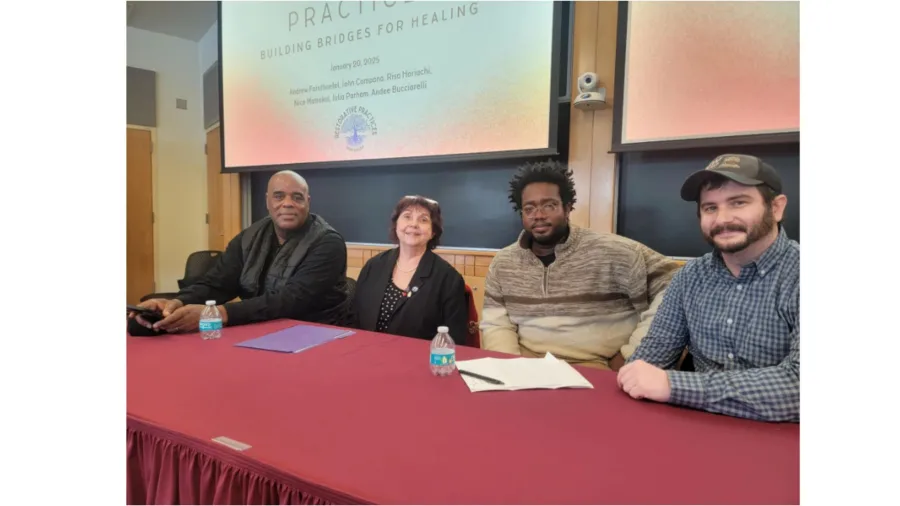Maine Union Members Speak on MLK Day Panel on Racial Justice & “Working Class Discontent”

PHOTO: APRI-Maine President Garrett Stewart, Western Maine Labor Council President Linda Deane, Phil Joseph (IBEWE 567) and Rep. Kilton Webb (IBEW 567).
On Martin Luther King Day, A. Philip Randolph Institute - Maine Chapter President Garrett Stewart, Western Maine Labor Council President Linda Deane (USW 900), State Rep. Kilton Webb (IBEW 567) and IBEW 567 member Phil Joseph spoke on a panel at Bates College titled “Working Class Discontent.” Discussion focused on issues and concerns that Maine workers have faced both before and after the election.
There was much debate between the panelists and audience about the influence of race on the election. Joseph, who says he has experienced racism in the workplace firsthand, said unions have a long way to go in becoming more inclusive to workers of color. He said many workers are more interested in voting based on their identity than their class interests, which makes it difficult to build solidarity along class lines.
“Do I think it’s necessary and imperative that we find a way to work together? Yes,” said Joseph. “But just based on my own personal experience, I think that there are some issues preventing that from happening.”
For instance, he said that most white workers will never say they don’t want to work with a black man, but they will say things like “We don’t want Somalis in here.” Originally from Michigan, Joseph said he spent two years trying to get into a union apprenticeship which he believes was because of his race. He watched as others were hired before him, despite him having the highest aptitude scores of any of the other candidates. He also applied for non-union jobs, but had similar struggles.
“A few times, even when I was applying for other jobs, things would be going great over the phone. ‘Philip Joseph’ is an unassuming name,” he said. “But then I’d show up in person and I could tell in the first couple of minutes that this was not going to happen.”
Numerous studies have shown African Americans continue to face job discrimination in America. One 2023 study conducted by Bowdoin Professor Martin Abel found that there were widespread beliefs among employers that people with names perceived to be Black "possess lower levels of education, productivity, and noncognitive skills.” They concluded that participants were 30 percent more likely to hire workers perceived to be white compared to Black.
Joseph eventually did get into an electrical apprenticeship in Michigan, but that was because there was a massive uptick in work and the union desperately needed more hands. He said it’s very difficult to get white coworkers to examine their internal racial biases because they naturally get defensive.
As he explains, “My mom would call it ‘living the unexamined life’ where they operate on the assumption that they’re good because they understand that, being union members, they’re getting compensated above average and that they also have more training. That can’t be because of a lack of systemic barriers in accessing [apprenticeships]. Many of them are legacy union members so this is also a matter of inheritance. So when you ask them to change their perspective or how people should enter into the union, especially when you link it to identity, they’re very fragile about the criticism because they think that you are judging them as a person. ‘I’m not bad, therefore I’m not a racist.’”
At the same time, he says unions are in a better position to build interracial solidarity than most institutions because they provide a structure for workers to engage in collective action for common goals that improve their material conditions. In this way, he says, union workers feel the impact of their activism personally, which is rare for activists outside of the labor movement. As a member of IBEW 567’s RENEW, a union committee for young worker activists, Joseph and his colleagues have been coming up with strategies to engage younger members in racial justice work.
“The primary problem in the union is cultural in my opinion,” he said. “But I still think it’s better than the alternative, which is why I’m still here.”
The real challenge is how to create a dialogue around race and labor that is appealing enough for people to open up rather than shutting down.
“You can only dress something up so much,” said Joseph. “If you speak in euphemisms there comes a point where you’re confirming the choice of the majority culture to suppress the identities of the marginalized.”
